| |
| |
| |
| Presented By Google |
| |
| Axios AM |
| By Mike Allen ·Nov 17, 2021 |
| 🐪 Happy Wednesday. Smart Brevity™ count: 1,096 words ... 4½ minutes. Edited by Zachary Basu. 🩺 At 12:30 p.m. ET today, please join Axios' Caitlin Owens and Sam Baker for a virtual event on innovations in early cancer detection. Register here. |
| |
| |
| 1 big thing: Extreme weather outruns world |
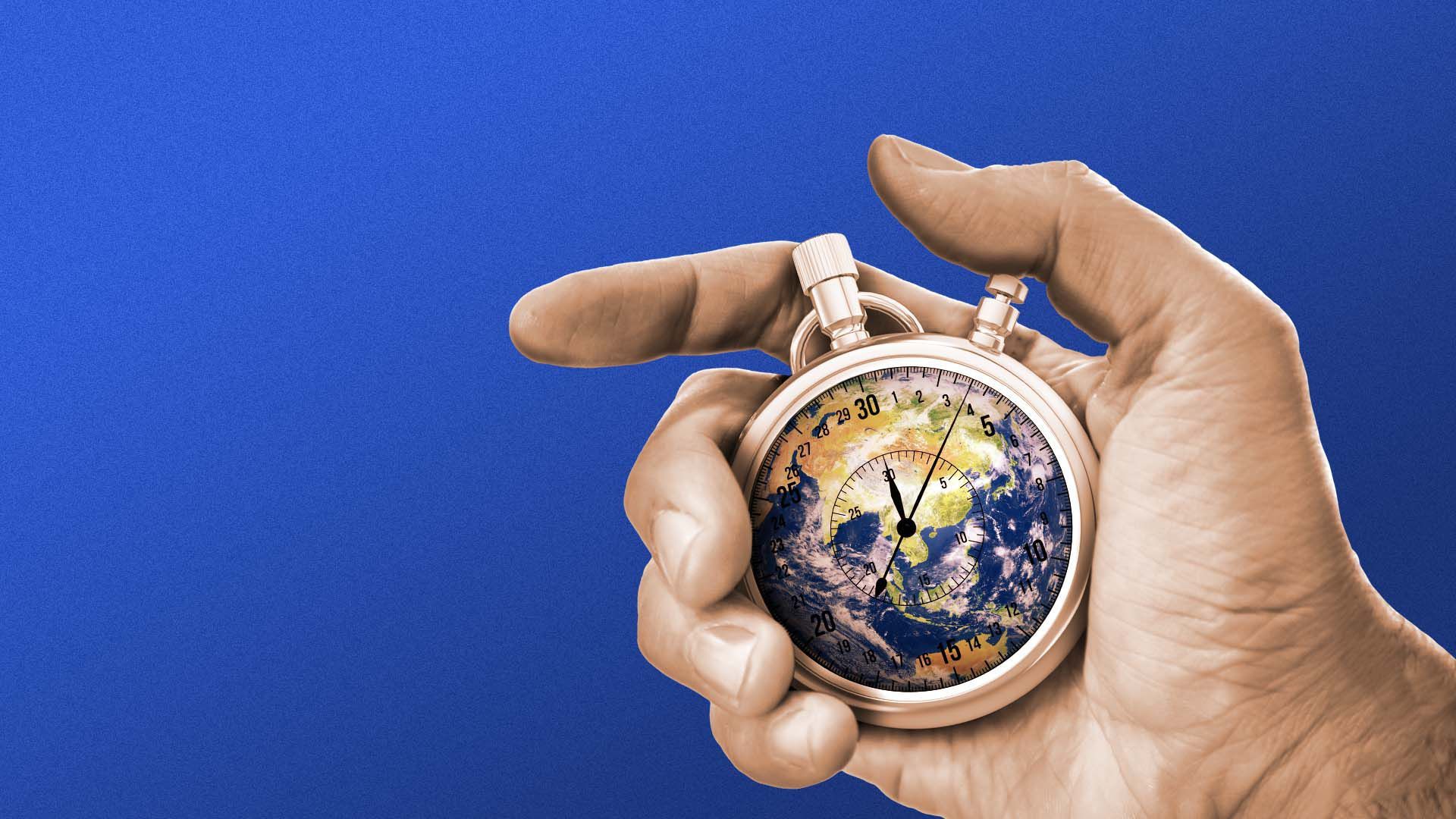 |
|
| Illustration: Sarah Grillo/Axios |
| |
| The pace and severity of climate change are outrunning humans' efforts to contain it, Axios climate reporter Andrew Freedman writes. - Why it matters: Extreme weather will continue to worsen, even if countries meet every commitment from the Scotland summit.
State of play: Severe flooding hit Canada and the Pacific Northwest before the ink was dry on the Glasgow agreements. - The nations attending the summit agreed to try to keep warming to 1.5° Celsius above preindustrial levels, though we're still on course to exceed the goal.
- Warming is still slightly below that threshold, at about 1.1°C, but we're barreling toward it — and already seeing unprecedented extreme events even before we get there.
What's happening: As the world warms, the odds of extreme weather and climate events are rapidly escalating. - Kate Marvel, a NASA climate researcher, says the future could hold "monsoon disruptions, the die-off of the Amazon rainforest, or the disintegration of the West Antarctic or Greenland ice sheets."
Being there: At multiple points during COP26, climate negotiators held up pictures of their grandchildren while making speeches about what the future generations will face due to climate change. - But climate disasters are occurring here and now, says Friederike Otto of the Grantham Institute at Imperial College in London. She specializes in studying how climate change affects extreme events.
🔮 What we're watching: Emerging research shows that if and when emissions reach net zero, additional warming would slow down quite quickly, said Michael Mann, a Penn State climate scientist. The bottom line: However bad extreme weather has gotten at the time we reach net zero, it's likely to stay there. |
    |
| |
| |
| 2. Charted: Biden's New Deal |
Graphic: Cowen and Company Chris Krueger of Cowen Washington Research Group narrates this eye-popping graphic from his D.C. Download newsletter: Fiscal policy remains at an 11 for the 2nd year in a row. Context and comparison went bye-bye over a year ago. Speed, scope and scale for fiscal policy under Biden is unprecedented; only question remaining is the magnitude. |
    |
| |
| |
| 3. COVID smashes office architecture |
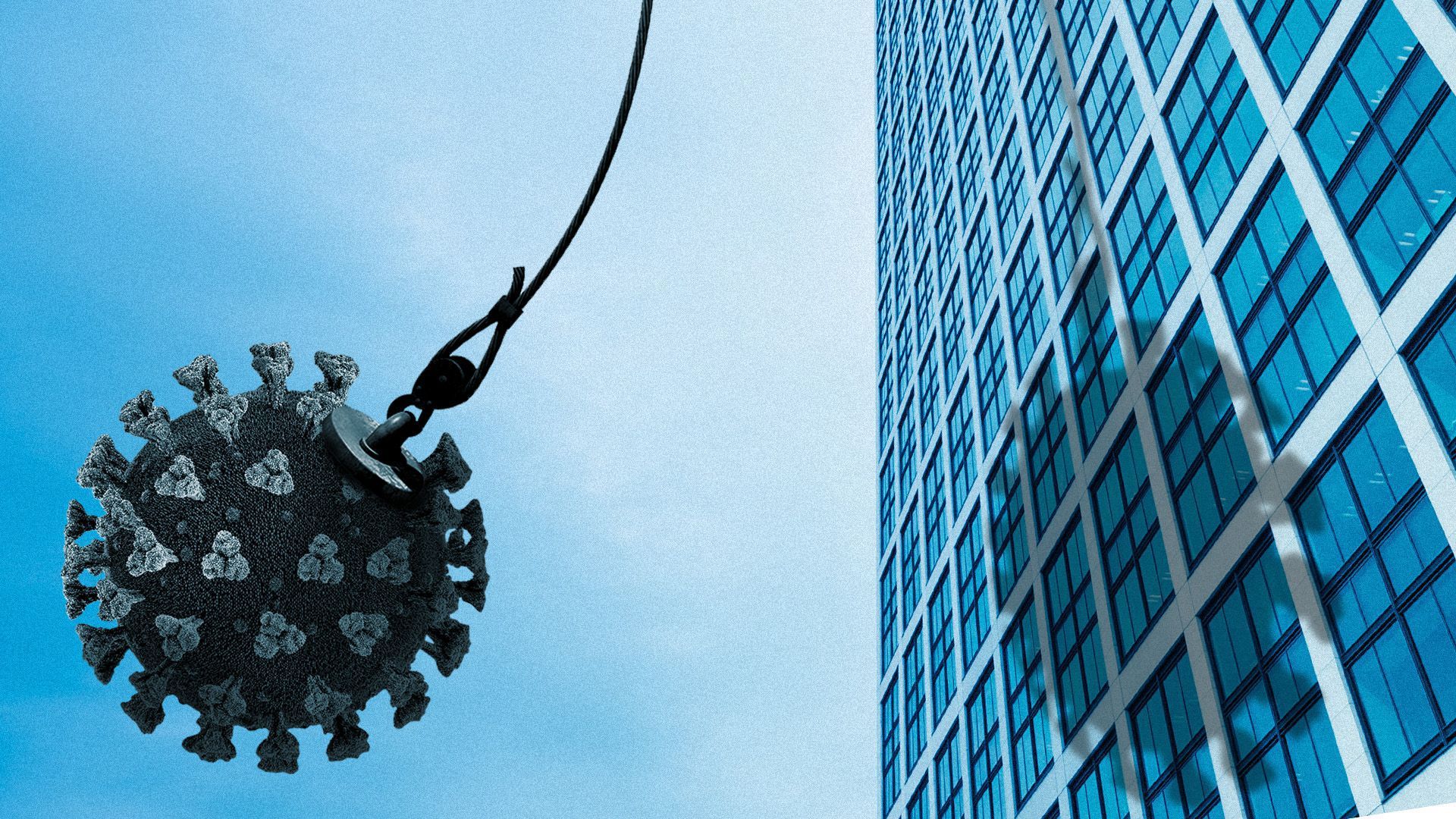 |
|
| Illustration: Shoshana Gordon/Axios |
| |
| The decked-out corner office for executives was already dying, but is now getting even scarcer, Erica Pandey writes for Axios What's Next. - Why it matters: As hybrid and remote work become more common, the office is becoming a destination for collaboration. Meeting rooms and open plan, café-like seating areas are replacing offices. Where you sit and work no longer denotes your place in the hierarchy.
What's happening: 60% of firms are redesigning their offices for the COVID era, according to a new report from commercial real estate firm CBRE, which surveyed big companies around the world. - Our old idea of private offices — earmarked for one person and decorated with framed family photos — is disappearing. Companies are replacing those with call rooms or study rooms that anyone can reserve as needed.
- A quarter are eliminating private offices entirely.
The firms that are holding onto private offices are downsizing them. Around 80% are limiting them to 149 square feet or smaller. - "People are choosing to do their heads-down work at home," says CBRE's Susan Wasmund, lead author of the report.
Companies are giving the square footage they're taking away from private offices to meeting rooms of all shapes and sizes. - And they're adding amenities to make workers' time in the office worthwhile — auditoriums, outdoor spaces and baristas.
Investment banks and law firms will likely be among the last private-office holdouts, retaining some aspects of formal office trappings. 👀 One more new trend: In the past, workers had to submit requests — and often provide medical reasons — to get standing desks. Now, 65% of firms say offering a sitting and standing option is standard. |
    |
| |
| |
| A message from Google |
| Google is committing $10 billion to advance cybersecurity |
| |
 |
| |
| By making all Google products secure by default, we protect billions of people from potential cyberattacks every day. And now, we're investing an additional $10 billion to modernize the security of governments, critical infrastructure, organizations, and businesses everywhere. Learn more. |
| |
| |
| 4. Pic du jour |
| Photo: Yue Yuewei/Xinhua via AP In this view from the Beijing end, President Biden and Xi Jinping greet each other via video link during their virtual summit Monday night. |
    |
| |
| |
| 5. Map of the day: America marches west |
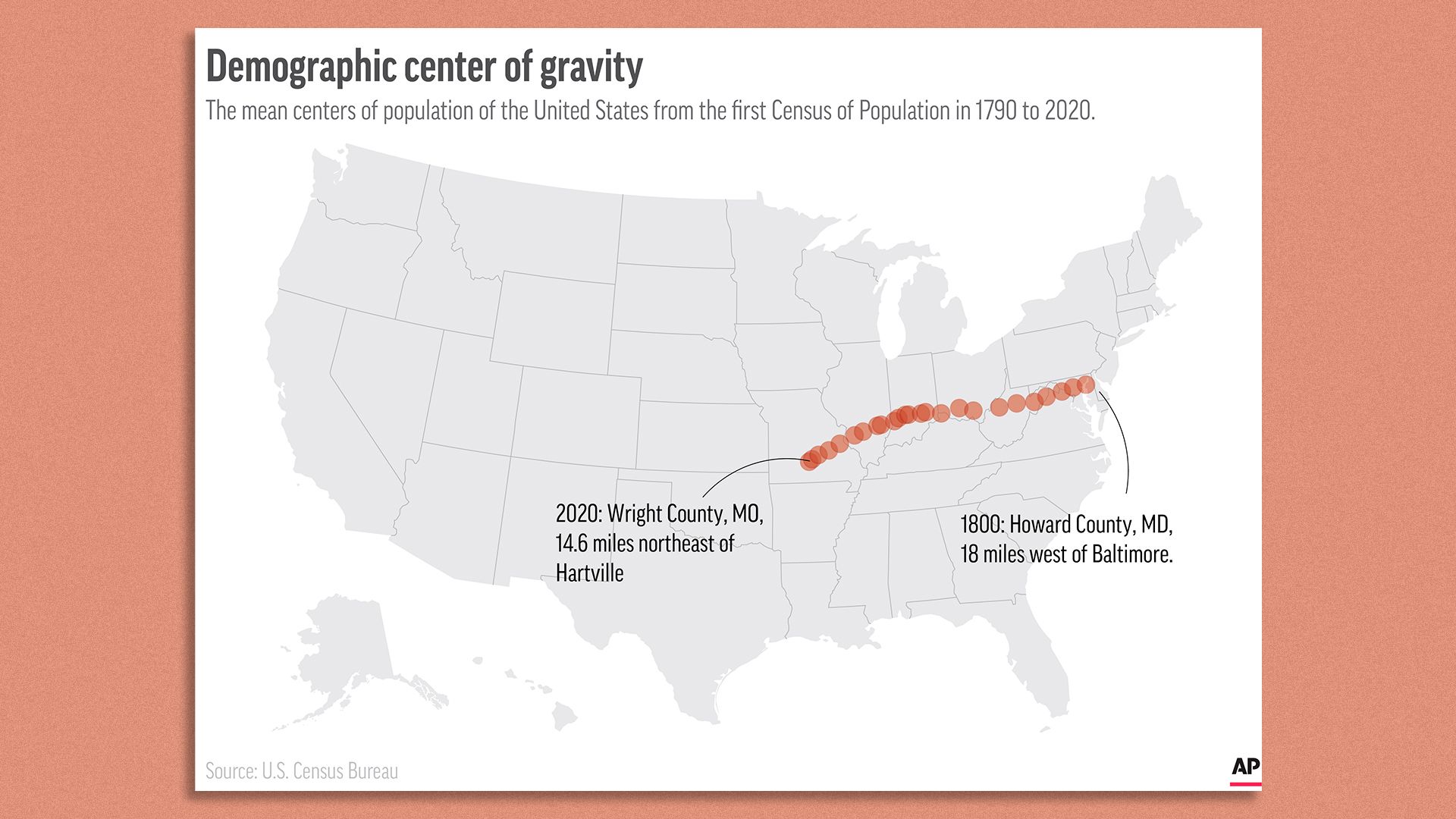 |
|
| Map: AP |
| |
| This map shows the population center of the U.S. shifting steadily west from the 1800 census (Maryland) through last year (Missouri). - The Census Bureau announced yesterday the U.S. center of population (the average of where 331.4 million residents lived) in 2020 was near Hartville, a town of 600 people in central southern Missouri.
Go deeper ... Decade by decade ... Watch a video. |
    |
| |
| |
| 6. Staples Center goes crypto |
 |
|
| Photo illustration: Sarah Grillo/Axios. Photo: Emma McIntyre/Getty Images |
| |
| Staples Center in L.A. — home of the NBA's Lakers, the NHL's Kings and the WNBA's Sparks — becomes Crypto.com Arena on Dec. 25, in a 20-year naming deal with the Singapore-based cryptocurrency exchange. - Why it matters: This reflects the mainstreaming of cryptocurrencies, Axios Pro Rata author Dan Primack writes.
Crypto.com paid more than $700 million for the rights — one of the biggest naming deals in sports history, the L.A. Times reports. Share this story. |
    |
| |
| |
| 7. Axios interview: Beto rejects Trump as foil |
| Texas Democratic gubernatorial candidate Beto O'Rourke speaks at a campaign rally in San Antonio yesterday. Photo: Jordan Vonderhaar/Getty Images Beto O'Rourke, sprinting through his second day as a Democratic candidate for Texas governor, rejected the playbook that failed Terry McAuliffe in Virginia. - "Trump doesn't live in Texas," O'Rourke told Nicole Cobler of Axios Austin in a phone interview, as he traveled from San Antonio to Laredo. "Biden doesn't live in Texas. 30 million of us are what's most important to me."
O'Rourke, in an uphill fight to unseat Gov. Greg Abbott, prodded President Biden to do more to protect voting rights: - "One thing that we really need [Biden] to do that he has not done is make voting rights a priority, because everything else flows from that. Everything else becomes possible once everyone who's eligible has the ability to vote."
Abbott responded to O'Rourke's Monday announcement by tweeting: "Beto wants to ... impose socialism - take your guns. Bring it." |
    |
| |
| |
| 8. Fears for China's missing tennis star |
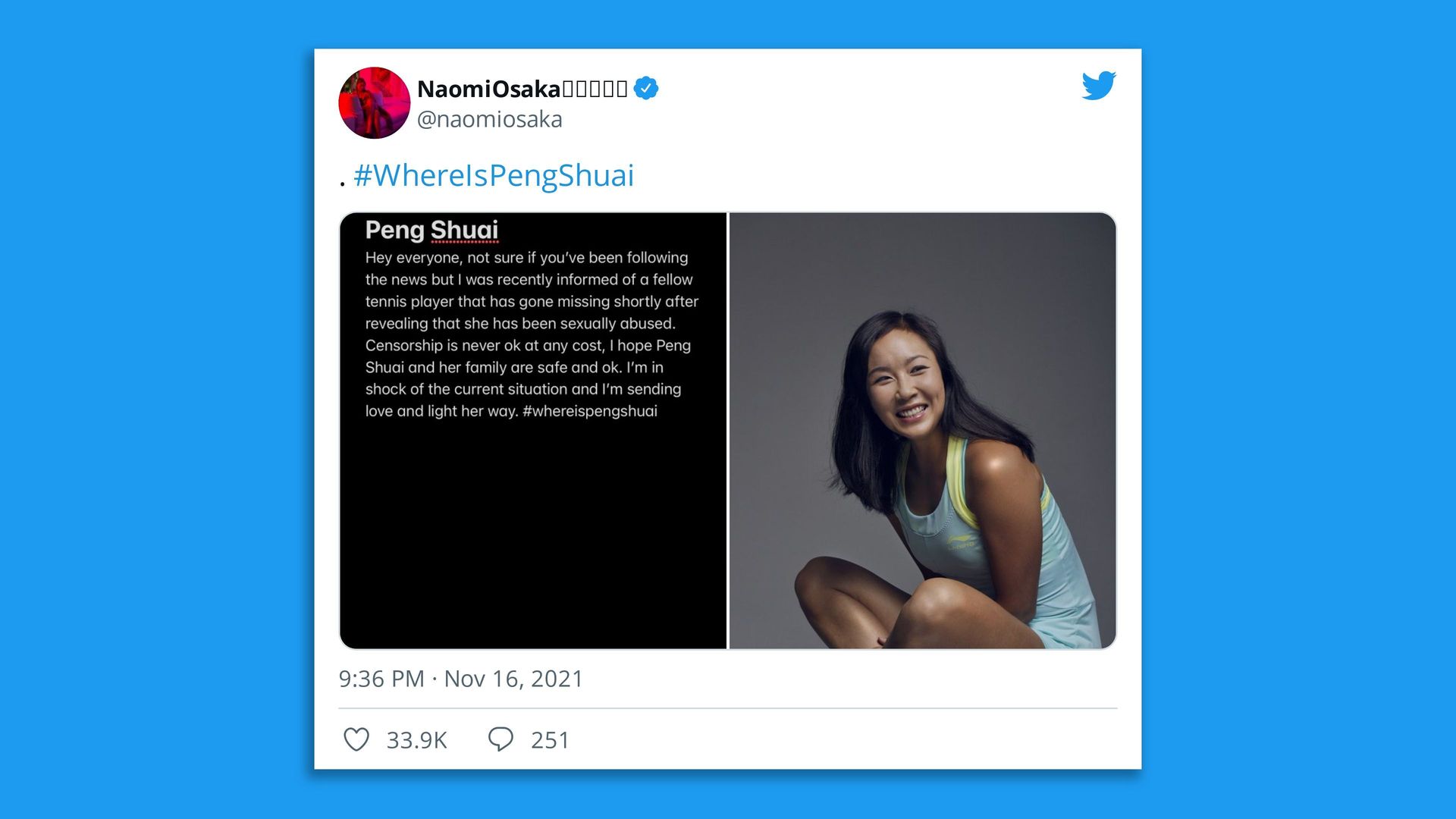 |
|
| Via Twitter |
| |
| Naomi Osaka and Novak Djokovic are the latest top athletes to voice concerns about the safety of Chinese tennis star Peng Shuai, who has not been heard from since accusing China's former vice premier of sexual assault on Nov. 2. - The allegations on Peng's social media page were removed within minutes, and China's state-controlled media has suppressed all reporting on the case.
- Tennis authorities have called for a full investigation into the allegations by the two-time Grand Slam doubles champion.
Go deeper. |
    |
| |
| |
| A message from Google |
| Google is training 100,000 Americans for jobs in cybersecurity |
| |
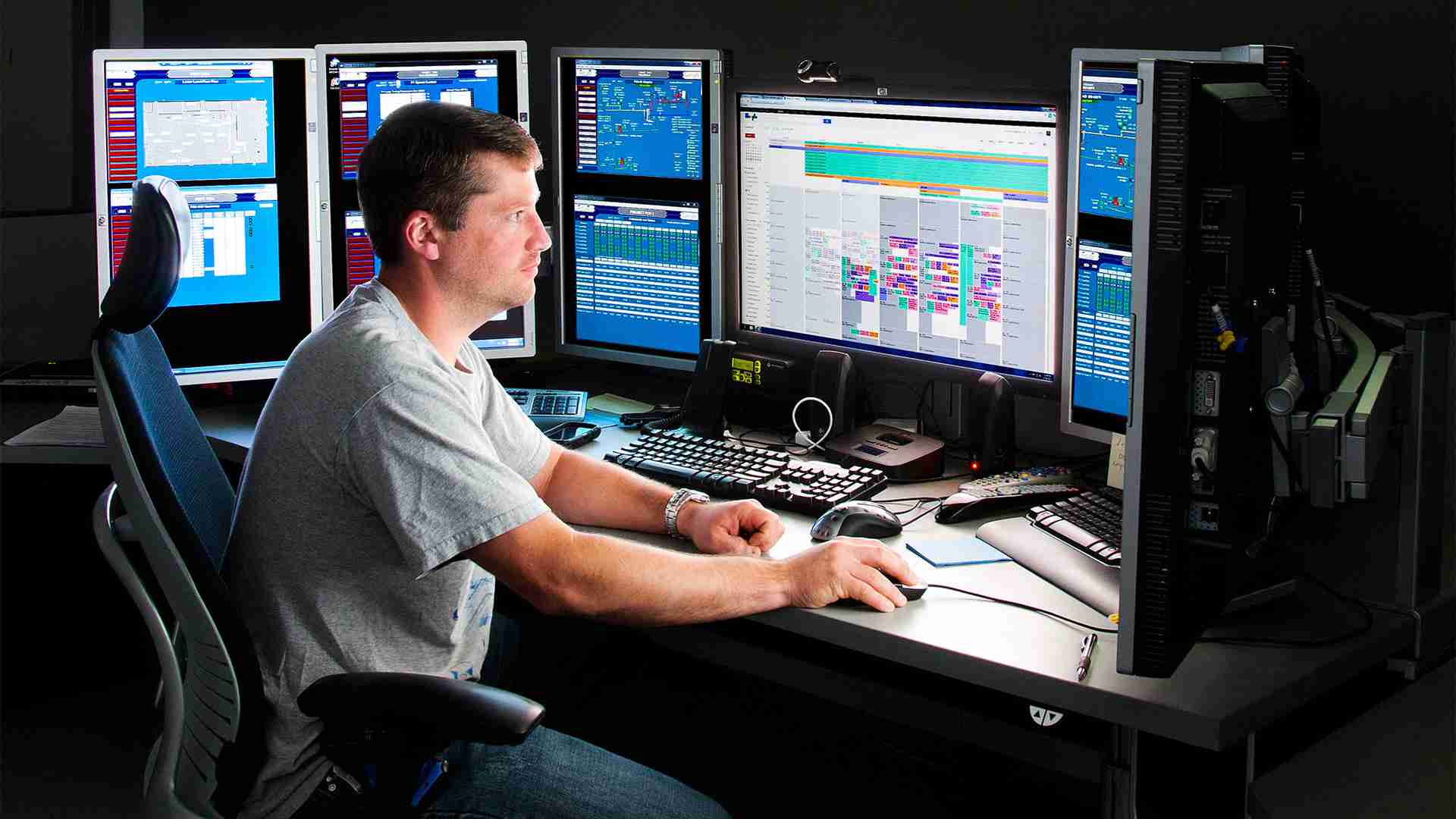 |
| |
| Google is investing an additional $10 billion to modernize the security infrastructures of governments and businesses. And since robust cybersecurity relies on having the people to implement it, Google is training 100,000 Americans for vital jobs in data privacy and security. Learn more. |
| |
| 📬 Was this email forwarded to you? Sign up here for your own copy of Axios AM and Axios PM. |
 | | It'll help you deliver employee communications more effectively. | | |




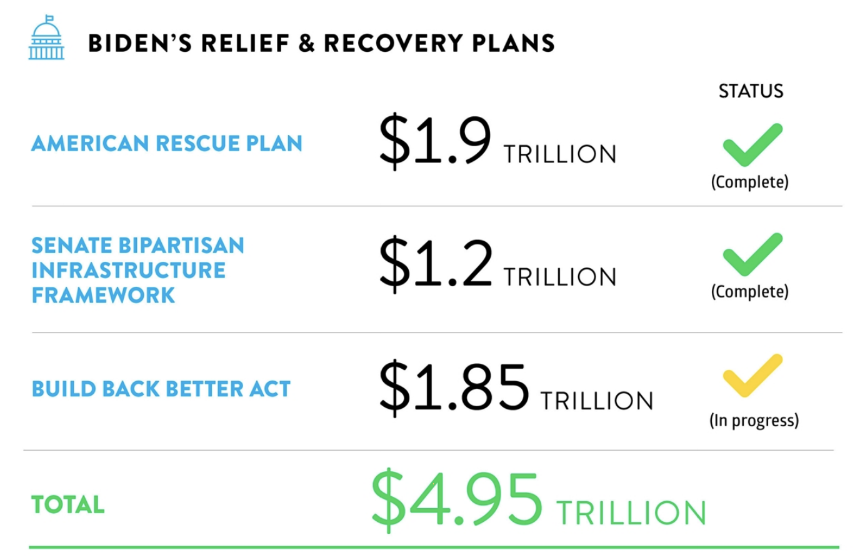

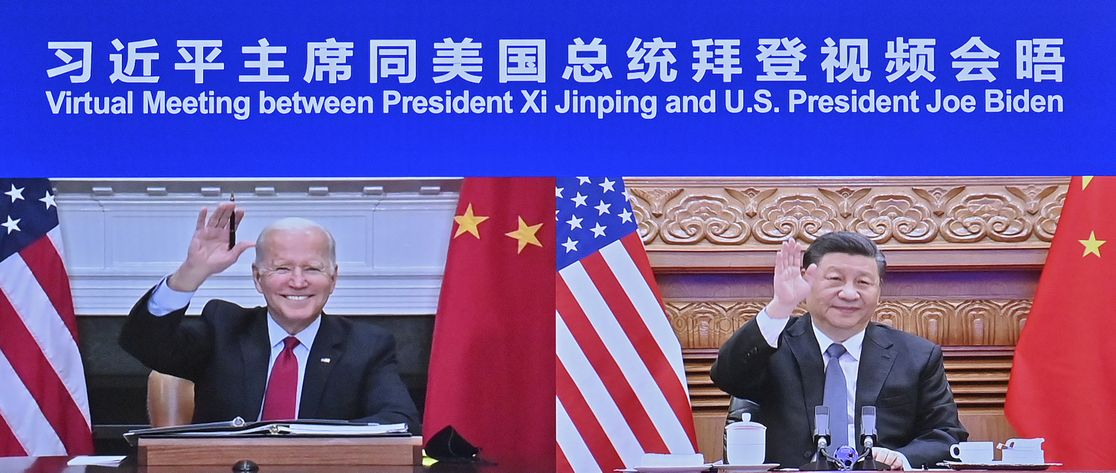






No comments:
Post a Comment